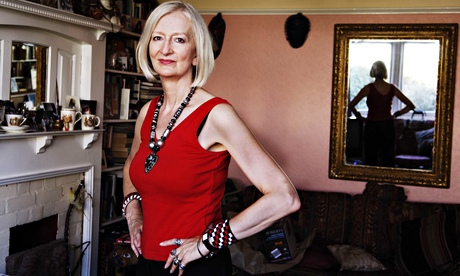
Maggie Gee was born in Poole, Dorset and has written 12 novels, including The White Family, which was shortlisted for the Orange prize. She has also written a writer's memoir, 2010's My Animal Life, and a collection of short stories. Gee is vice-president of the Royal Society of Literature and a professor of creative writing at Bath Spa University.
Your new novel, Virginia Woolf in Manhattan, imagines the writer coming back to life in modern-day New York. How did you arrive at that idea?
I went to New York to read Woolf's manuscripts in the Berg collection. When I got there I learned that you can't access them physically because they are too valuable – you have to view them on microfilm. So I was sitting there, longing for her, and I started to imagine what she would have made of today's world.
I'm sure that the adventurer in her would have loved to come back. The fun in the book – because it is definitely a comedy – comes from her discovering the internet for the first time, seeing bookshops closing down, going shopping. She loved clothes; I think she would have enjoyed Bloomingdales. I've always felt that, although of course it is terrible that she drowned, she would not have wanted us to focus on that. She was overwhelmingly positive about life.
Was it difficult to capture her voice?
This book took me five years, which is longer than any of my other books, and halfway through I got completely stuck and nearly gave up. I have lived with Woolf for so long – I did my PhD on her – that her influence can be quite overwhelming. I didn't want to violate her voice, but at the same time I wanted to create my own 21st-century version of her. Reverence isn't good for a writer. Respect is important, and careful reading, but reverence doesn't help anyone – and I think Woolf would have understood that.
How do you think Woolf would feel about the position of female writers today?
Female writers are seen as "young" and "promising" for longer than men are. When people think of the really good writers in the culture, they tend to think of the men first – still. Having said that, Woolf would not recognise the landscape now – she would be thrilled to see so many women doing so well.
Your daughter, Rosa Rankin-Gee, published her first novel last year. How did you feel about her following in your footsteps?
Writing novels is a ghastly profession, and only a foolish parent would totally encourage it. It's so insecure, and you have to be on your own such a lot, and Rosa is gregarious. My husband, Nick, and I really discouraged her from reading English – so she did modern languages, went to Paris… and wrote a novel! Once I'd read the book, of course I completely supported her. It would have been horrible if it was no good, or if she wrote just like me. But she uses language in a completely fresh way; her work is nothing like mine.
This book considers how Woolf would have felt about her literary legacy. Have you thought about the legacy of your own writing?
I want literary fiction to engage with real life, not disappear up its own fundament. I've written quite early about things that are hard to write about – like racism – and I've tried to write about characters who aren't the same as me – from angry white men to Ugandan cleaners. If you don't win big prizes, it keeps you going in all sorts of different directions. There is something that isn't necessarily wholly positive about acclaim – it can be deafening.
Is there a great pressure by this stage of your career to have one of the big prizes under your belt?
I don't feel secure, to put it mildly. I was delighted that there was an international conference about my work [in 2012, at St Andrew's University]. But it is a precarious business. For independent publishers like mine, prizes are really important, so I would like to win for them. But I also know that it's madness to feel that pressure, it's not helpful. And as I say, it has kept me moving on to the next challenge. Perhaps I still feel promising!
You are now a professor of creative writing. Where do you stand on the debate about creative writing courses?
I find it incredibly inspiring working with younger writers. It's what jazz players do – they always play with younger musicians, to keep themselves fresh. I was amazed when Hanif Kureishi said that 99.9% of his students aren't talented. It's just so weird – he can't be listening. Teaching must be so awful for him, if he thinks that. I just don't get it.

